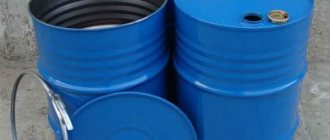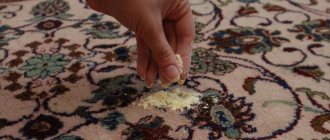The fishy smell has one unpleasant feature - it is deeply absorbed into almost all surfaces. It is not always possible to remove it with a simple rinse with water.
For this reason, many housewives refuse such a useful product, which is not worth doing. Read the article on how to completely remove fish smell from clothes, dishes, refrigerators and more.
Wash
Of course, the first thing you think about when stains or an unpleasant smell has formed on your favorite dress is how to remove the smell of fish from clothes. This really works, but only if the dirt and smell are not strong and have appeared recently.
To make washing more effective, add some lemon juice to the powder, and also use fabric softener, which has a pleasant aroma.
Important! Baking soda is a great way to absorb odors. Alternatively, you can simply use it instead of washing powder.
Why does fish smell so bad?
The fishy smell, which is familiar to every person, does not appear immediately.
When a fish is just caught from the water, it has practically no smell - you can only feel the aroma of the body of water in which it lived. A characteristic smell appears only when decomposition processes begin in it, and the more active these processes occur, the stronger the fish smells. 1. The proteins that make up fish meat differ from the types of proteins that are found in the meat of land animals. They decompose much faster, therefore decomposition products, such as ammonia and sulfur compounds, which have a strong unpleasant odor, are formed within a few hours after removing the fish from the water.
2. Many species of fish are predators and feed on their much smaller counterparts. In this regard, the digestive system of fish produces a large number of enzymes that help digest other fish. If, after catching, some of the enzymes end up on the body of the fish, then over time they begin to digest it from the outside, which also causes an unpleasant smell of decomposition. For this reason, it is recommended that the fish be gutted as quickly as possible after being caught.
3. Fatty acids, which appear during the oxidation of unsaturated fats, have an unpleasant odor. Fish meat contains much more such fats than the meat of land animals, and they oxidize in air much faster than saturated fats.
Soak
If you are afraid that the machine will not be able to clean the product and eliminate odors, and you don’t want to waste time, then try soaking the item before removing the smell of fish oil from clothes. Here you can use the following options:
- In a solution of hot water and a large amount of laundry soap shavings.
Important! It is very important that the soap is dark. The darker it is, the more alkali it contains, which can remove the lion's share of stains and odors. Why this product is universal for almost all cases of stains, and not only on clothes, read our separate article “What is laundry soap made of?”
- A similar option is to soak the item in a solution of warm water and a small amount of vinegar. This way, it will be much easier for the machine to cope with the task, and you are guaranteed to get the best result after the first wash.
- White items are soaked in bleach. The most important thing is that the product does not contain chlorine, which can harm the material. Soak the item in it and leave it for an hour, then put it in the washing machine.
Important! Depending on the circumstances under which you have a problem with the smell of river and sea creatures, you may also find our other tips useful:
- How to get rid of the smell of fish in a pan?
- How to remove fish smell from a knife, cutting board, or hands?
Chem further
If all your efforts are in vain or the item is too delicate to apply radical methods to get rid of an unpleasant odor, contact a dry cleaner. This is not the cheapest method, but specialists have more ways to get rid of unpleasant odors and difficult stains, so with a high degree of probability you can be sure that they will be able to remove them.
The smell of fish on clothes can ruin anyone's mood, but if you know how to remove it and get rid of it in time, it will soon leave you and your favorite things forever.
Dishwashing liquid
If you have an expensive and branded dishwashing detergent at home, then you can also use it to combat fishy smell. These lemon-scented products are especially good:
- Pour a little onto the stained area.
- Leave for half an hour and then wash by hand.
Important! Please note that machine washing is not suitable in this case. This product produces a lot of foam, which deceives the sensors. Thus, not only will things not be washed, but your equipment is at risk of being broken.
Boiling water
It should be noted right away that this method is only suitable for white items made from dense natural fabrics:
- Fill half a pan with water and add one piece of laundry soap into it.
- Place the container over medium heat, place the clothes inside and bring to a boil.
- After this, keep the item in the solution on the fire for another thirty-five minutes.
You will be able to see how well this treatment works - not a trace of the fish smell will remain.
How to remove fish oil smell from clothes?
Even if you are not in the room with fish for a long time, the oily residue that you may accidentally develop while eating can cause stench. To get rid of them:
- Heat the glycerin by mixing it with a couple of teaspoons of ammonia.
- Apply the resulting liquid to the fabric for an hour.
- Afterwards, you need to wash your things.
Features of treating various fabrics against mold
Correctly remove the unpleasant smell of mold from clothes - take into account the color, type of fiber:
- For white, light-colored fabrics, the use of compounds with chlorine, peroxide, and bleach is allowed.
- For colored materials, a solution of ammonia and water is suitable.
- Wash leather items with powder and laundry soap.
- Ventilate fur coats and fur products in the wind, dry them in the wind. If the tag is washable, add sterilizer to the machine. Then thoroughly dry and ventilate, and treat with a steamer.
The second hand smell can be eliminated using this method:
- Sort by color.
- Add 50 ml of ammonia to the basin.
- Keep synthetic material for up to 6 hours, cotton and calico for up to 3 hours.
- Squeeze and hang on the balcony.
- The condition is that the moisture must leave, only wash the product afterwards.
- Rinsing involves adding fragrance and conditioner.
Interesting methods for skin:
- If there is mold on a leather bag, use cotton wool soaked in vinegar. Put it inside. Wrap the product in polyethylene. Leave for 6 hours. Then ventilate thoroughly;
- For leather shoes, do the same procedure. But the exposure time for vinegar should be 24 hours. Afterwards, remove the cotton wool and wipe the inside with ammonia.
You can thoroughly air your boots and treat them with shoe deodorant.
Tips and tricks:
- If your job involves constant contact with fish, and odor control is a regular procedure for you, then try cleaning several things at once - this way you will save cleaning agent.
- If you have time, before you start washing, wrap clothes saturated with fishy smell in sheets of plain paper or newspaper - it will be able to absorb most of the “aromas”.
- After washing, clothes should be dried in a well-ventilated area, or best of all, outside. By the way, it’s even easier in winter, since frost also neutralizes nasty odors.
Important! A rather specific and pungent smell should not be a reason to refuse such healthy food. Moreover, now you know how to deal with it. We also invite you to read about different cooking methods. Click on the link where we described in detail which fish is best to fry in a frying pan.
Bonus: other ways to remove grease stains
There are several different ways to remove grease from clothes. For example, you can sprinkle corn starch, talcum powder or baking soda on the dirt, place a clean rag or paper napkin on the front and back sides and iron the fabric from the back. As the paper or fabric becomes saturated, it should be replaced with a new one. Vegetable oil can be washed off if you apply kerosene to the stained area. We arm ourselves with a cloth, moisten it in the cleaning agent, carefully rub off the oil trace and send the product for washing in a soapy solution. We clean silk and wool by pouring talc onto the dirt, placing a blotter on top and ironing.
A more drastic remedy is treatment with a piece of cotton wool soaked in purified gasoline. Apply gasoline to the fabric, sprinkle talc on top and leave the item of clothing for an hour. If necessary, replace talc with chalk or tooth powder. The following folk recipe helps with old greasy marks: mix ammonia, salt and water in proportions 1:1:3. We ventilate the product and send it to the wash. If the fat just gets on your clothes, a bread crumb will save you: pinch off the pieces and apply them to the stained cloth. Another recipe for quick help: sprinkle salt on top and carefully lose. When the salt layer is saturated with fat, brush it off and apply a new one.
How to remove greasy stains from fish
1. To remove greasy fish stains from clothes, tablecloths, or any other fabric, you don’t need to wait, you need to wash them immediately. 2.An effective remedy is to sprinkle potato starch on the greasy stain. Starch absorbs all the fat contained on your fabric. After half an hour, remove the starch from the fabric using a brush. Another equally effective way is to pour two tablespoons of water onto one tablespoon of 8% vinegar, then wet the stain, put the product in the washing machine, choosing a washing program suitable for this fabric. 3.If you don't want to bother with Starch or Vinegar, then use simple stain removers made specifically to combat greasy stains on various fabrics. Vanish type stain remover is applied to the stain during washing. This method will help get rid of odor and greasy stains without much effort. 4. Dried fish stains can be easily removed with glycerin and ammonia. This mixture is made like this: mix 1 teaspoon of glycerin with 2 teaspoons of water, then add six drops of ammonia and thoroughly lubricate the stain and leave it to dry for 20 minutes, then rinse the fabric in a soapy solution and wash in the usual way. A mixture of glycerin and ammonia removes stains from any type of fabric, these include artificial and natural silk, velvet, acetate, velor, guipure. 5.If it happens that you have stained a cotton fabric, then pour warm water into a container, add a cap of bleach that contains chlorine, and soak the fabric for 15 minutes, then wring it out, rinse, and put it in the washing machine, selecting the mode for cotton products. 6.Well, and lastly, another effective way to remove grease stains from any type of fabric is a simple detergent that everyone has in their kitchen. Lubricate your stain generously and leave it to soak for a day, then simply rinse in water and put it in the washing machine. This method is safe for any type of fabric and removes fish stains and odors well.
7. Potato flour is considered a good remedy for old grease stains on any surface. Flour should be diluted with water to a thick porridge and grease the contaminated surface with this mixture. After a few hours, you need to remove the remaining slurry with a rag soaked in gasoline. Finally, wipe off any remaining stains with stale black bread.
8. Fill the stain with hydrogen peroxide overnight. Then wash as usual.
9. Pure alcohol will also help remove greasy stains. For this method, add a teaspoon of ammonia and half a teaspoon of gasoline to half a glass of alcohol. Mix well and saturate the stains with this mixture. Then you need to let the fabric dry.
When cooking or carelessly consuming fish-based dishes, particles of the product end up on clothes, leaving an odor that is not easy to get rid of using either traditional methods or special means. To remove foreign odors from clothes without visiting a dry cleaner, you need to know some tricks and also use household chemicals correctly.
All fish, to a greater or lesser extent, have a characteristic aroma, which appears for the following reasons:
All this leads to the fact that upon contact with chilled fish, an unpleasant odor quickly permeates clothing, but it is not easy to eliminate. As soon as mucus or pieces of fillet get onto a T-shirt or trousers, measures must be taken to get rid of the specific aroma.











